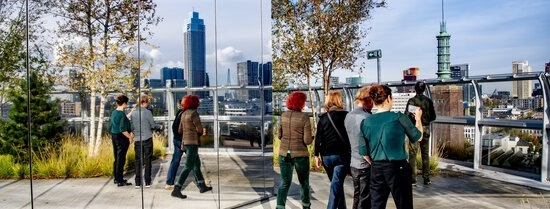Mission
Team Public Issues and Imaginaries produces knowledge to imagine forms of (more-than) human living that lead to less exploitation, extraction and inequality, and that are more democratic, sustainable and liberating. That is why we develop education and research on pressing and current public issues (urban politics, work and digitalization, migration, race, gender, class and inequality, and global warming). Our ways of working (together) are characterized by the critical and constructive analyses and interventions we produce. By the fact that we use education and research on public issues as (our) ways to engage others in the production of knowledge and possibilities for just futures. And by our ambition to transform current scientific and academic practice and the university we work in.
Research
Our interdisciplinary research produces historical, political-economic and sociologisch analyses of inequality and injustice’s (re-)production. In which institutions and practices does this happen? In what ways? And with the use of which technologies, policy frameworks and (scientific) methods? But our research also explores how practices, technologies and methods can be re-imagined from the perspective of equality and justice. We take on these two tasks as critical and public sociologists, who continuously iterate between conceptual reflection and methodological practice.
We pay special and critical attention to the following social institutions, policy areas, technologies and methods: family relations; (regulation of) automated work; urban digitalization and urban development; data science and methods of the social sciences; racial capitalism; migration and integration politics; anti-racism and DEI policy (Diversity, Inclusion and Equity), and environmental management.
Click on a research topic to learn more about our research:
• Organisational Dynamics in the Digital Society
• Family and inequality
• Migration and diversity policy
• Migration and integration
• Anti-discrimination policy
• Racial capitalism
• Urban diversity
• Smart cities
• Cities and inequality
• Vital cities and citizens
Education
Education is our way to engage students in the production of knowledge and possibilities for just futures. In the BA in Sociology programme we teach (philosophy of) social science methods and sociological theory. In the Master Sociology, we coordinate and/or contribute to Engaging Public Issues, Social Inequalities, Digitalisation in Work and Society and Grootstedelijke Vraagstukken. We are committed to interdisciplinary education. That is why we participate in education programmes beyond our own department, for example at Erasmus University College and the Erasmus School of Philosophy. And that is why we take leading roles in, for instance, the ESSB Bachelor Honours Programme, the EUR-wide Master Honours Programme Tackling Inequalities and the Leiden-Delft-Eramus Minor From Smart to Shared Cities.
Impact
We want to share insights and help make existing forms of knowledge and data accessible to accelerate the formation of those publics that can and will transform inequality and injustice. We try to do so in our teaching, with our research and through our active contributions to public discourse and debate. But we also try to do so by collaborating with existing initiatives, organizations and networks that fights social and planetary exploitation and extraction in ways that are premised on equality, respect and reciprocity. In so doing, we want to stimulate a different perspective on “academic impact”, “responsible science” and the “civic university”. A perspective in which our universities, including our own, take responsibility for and actively transform their own role in historical and ongoing inequalities and injustices.
